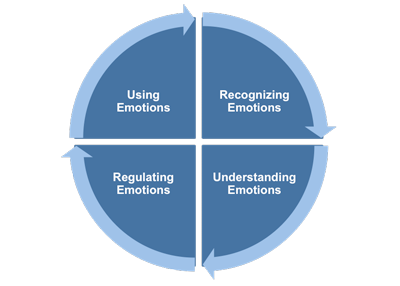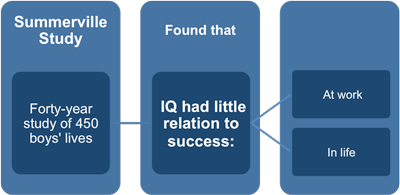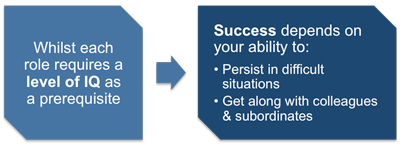Emotional Quotient (EQ) and IQ
When psychologists first began to write and think about intelligence, they focused on cognitive aspects such as memory and problem solving for the simple reason that they are easy to measure. This became known as Intelligence Quotient, or IQ. However, there were researchers who recognized early on that the non-cognitive aspects were also important.
As early as the 1940s psychologists were referring to 'non-intellective' as well as 'intellective' elements of intelligence, by which they meant personal and social factors. Furthermore, they proposed that these non-intellective abilities are essential for predicting someone's ability to succeed at work and in life.
These theories were given support by the Ohio State Leadership Studies (1940s) which found that leaders who are able to establish 'mutual trust, respect, and a certain warmth and rapport' with members of their group will be more effective. In addition, the US Office of Strategic Services developed a process of assessment that included the evaluation of non-intellective abilities.
This evolved into the 'assessment center,' which was first used in the private sector at AT&T in the mid-1950s. Many of the personal attributes measured in assessment centers involve social and emotional factors such as initiative, sensitivity, and interpersonal skills.
The psychologists Salovey and Mayer first used the term 'emotional intelligence' in 1990. They defined it as 'a form of social intelligence that involves the ability to monitor one's own and others' feelings and emotions, to discriminate among them, and to use this information to guide one's thinking and action.'
Salovey and Mayer began a research program to develop valid measures of emotional intelligence and to explore its significance. Underlying Salovey and Mayer's approach was the belief that there are a small number of specific skills all of which have to do with either accuracy or effectiveness.
 |
These could be summarized as an accuracy at perceiving and understanding emotional state in the self and in others, and effectiveness of regulating, controlling, and using these emotions in order to achieve one's goals. They proposed that there are four fundamental aspects to emotional intelligence:
• Recognizing emotions
• Understanding emotions
• Regulating emotions
• Using emotions
The whole idea of emotional intelligence as something worth serious study appealed to a growing group of researchers who were becoming concerned with how poorly traditional IQ tests predict an individual's future success. A number of scientific studies have rated IQ as accounting for between 4% and 25% of the variance in job performance, which is far lower than one might initially expect.
Even if the 25% figure were accepted, this would mean that three quarters of the variability that we see in job performance is not the result of IQ and must be due to something else.
 |
An example of the research on the limits of IQ as a predictor is the Sommerville study, a 40-year investigation of 450 boys who grew up in Sommerville, Massachusetts. The study found that IQ had little relation to how well they did at work or in the rest of their lives. What made the biggest difference were childhood abilities such as being able to control emotions and get along with other people.
The impression has sometimes been given that high emotional intelligence might somehow compensate for a low IQ. This has given the false impression that IQ doesn't matter very much. This ignores the fact that in certain jobs the ability to pass examinations is a prerequisite and this may demand a high IQ.
 |
However, once you are established in that particular job, success is more likely to depend on your ability to persist in the face of difficulty and to get along well with colleagues and subordinates than it is on having an extra ten points of IQ.
You may also be interested in:
Understanding Emotional Intelligence | Goleman's Model of EI | EQ and Management | EQ Timeline | Can EQ be Developed? | Personal Competence | Social Competence | EQ Framework.



